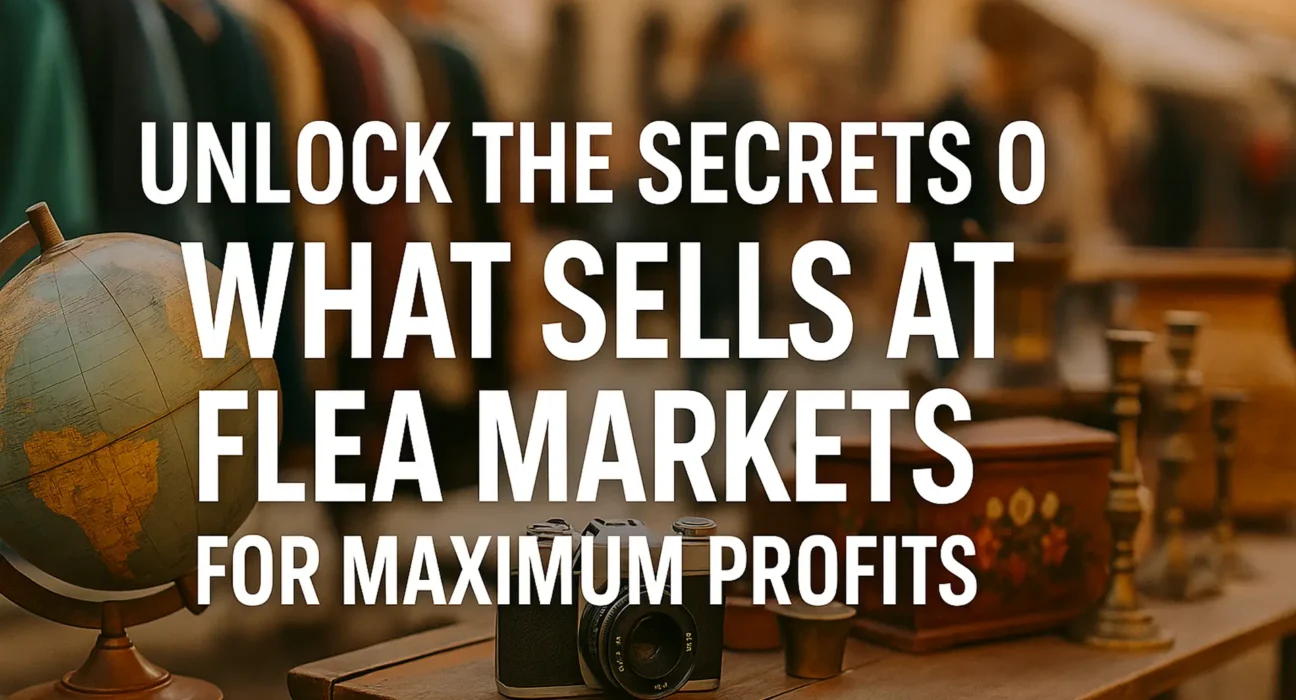Have you ever walked through a bustling flea market, looked around, and thought, “What exactly is making these sellers money?” If so, you’re not alone! Whether you’re a weekend warrior or dreaming of turning flea market selling into a full-time gig, knowing the flea market best selling items is your golden ticket to maximum profits.
In this guide, we’re diving deep into the secret sauce of flea market success. We’ll go beyond just listing products—you’ll get real strategies, top-selling categories, pricing tips, and even display hacks that make people stop and buy. So, if you’re wondering what to sell at the flea market or even what sells the best at flea markets, you’re in exactly the right place.
Why Flea Markets Still Rock in 2025
Let’s face it—between online marketplaces and big box stores, you might wonder if flea markets are still worth it. Here’s the truth: they absolutely are.
Flea markets aren’t just about cheap goods anymore—they’re about unique finds, nostalgic treasures, and real human interaction. People crave that “thrill of the hunt” experience. And when you hit the right niche, the profits are surprisingly high.
The Psychology Behind What Sells at Flea Markets
Before we get into the items, let’s talk mindset. The reason certain things fly off the tables and others gather dust isn’t random. It’s psychology. Here’s what draws buyers in:
- Nostalgia: Vintage toys, retro signs, and old-school gadgets stir memories.
- Bargain hunting: People want to feel like they’ve discovered a deal.
- Uniqueness: Handmade, upcycled, or one-of-a-kind items win big.
- Utility: If it solves a problem or fills a need, it sells.
Top 20 Flea Market Best Selling Items
Let’s get into what you came here for. These are tried-and-true flea market best selling items that rake in the cash week after week.
1. Vintage Clothing and Accessories
Retro is always in. Think ‘90s windbreakers, ‘70s bell bottoms, and funky jewelry. Display items neatly and offer mirrors—people love to try before they buy.
2. Tools – Especially Hand Tools
Old-school tools are a magnet for DIYers and homeowners. Think wrenches, hammers, and saws. Bonus: they’re easy to clean and resell.
3. Electronics and Accessories
Chargers, adapters, old game consoles—if it still works, it still sells. Even vintage radios and cassette players have a following.
4. Homemade Soaps and Lotions
Health-conscious and eco-friendly buyers are looking for local alternatives. Make it smell amazing and you’re halfway there.
5. Antiques and Collectibles
Old postcards, porcelain figurines, vintage signage—these attract serious collectors and casual browsers alike.
6. Upcycled Furniture
A fresh coat of paint on an old chair can double its value. If you’re handy with tools, upcycling is a goldmine.
7. Local Honey and Organic Produce
Farmers markets and flea markets often overlap. Fresh, local, and organic goods are in high demand.
8. Vinyl Records
Vinyl is having a massive comeback. Bonus points if you know your genres and have rare finds.
9. Books – Especially Rare or Niche
Children’s books, self-help, cookbooks, or first editions can all be profitable.
10. Handmade Crafts
Think wood carvings, hand-sewn items, custom candles, or crochet pieces.
Also read this: The Top 20 Products That Sell Best at Flea Markets – It complements everything we’re discussing here.
Unexpected Items That Sell Surprisingly Well
Ever heard of selling pinecones? Yup, it happens. Here are some sleeper hits you might not expect:
- Empty picture frames – Crafters and decorators love them.
- Old magazines – Especially fashion, sports, or historical ones.
- Vintage kitchenware – Pyrex, enamel pots, and utensils.
- License plates – The older, the better.
- Board games (even if incomplete) – Some buyers want parts, not the whole game.
What Not to Sell at Flea Markets
Knowing what not to bring is just as important. Avoid:
- Broken electronics (unless labeled “for parts”)
- Outdated tech like VHS tapes (unless rare)
- Stained clothes or torn fabric items
- Mass-market knockoffs – They’re often illegal and unpopular
How to Price Like a Pro
1. Don’t Be Too Attached
If you price based on sentiment, you’ll lose sales. Be objective.
2. Use the “Rule of 3”
Price at least three times what you paid or invested in materials.
3. Be Ready to Haggle
It’s part of the culture. Price just a bit higher so you have room to come down.
Display Tips That Draw Buyers In
You can have amazing stuff, but if your booth looks like a garage sale disaster, people will walk by. Here’s how to fix that:
- Use vertical space: Shelves, crates, and hooks make it easier to browse.
- Group similar items together: It makes things easier to find.
- Keep it clean and open: Messy booths = less trust.
- Have a tablecloth: It makes your setup look polished and intentional.
Seasonal Flea Market Selling Strategies
Selling flip-flops in winter? Not ideal. Adapt your inventory to the seasons:
- Spring: Gardening tools, seeds, outdoor furniture
- Summer: Sunglasses, cold drinks, picnic gear
- Fall: Halloween décor, sweaters, craft supplies
- Winter: Scarves, gloves, Christmas items, candles
Also read this: Intel Stock Is a Speculative Investment With Huge Potential From This Factor
Location Matters More Than You Think
The same item might sell great at one market and flop at another. Try different locations and keep records. Urban markets love trendy and vintage, while rural markets lean more towards tools, farm goods, and home essentials.
Boost Your Sales with Digital Payment Options
Cash is king—but not the only royalty anymore. Accept Venmo, Cash App, PayPal, or credit cards (Square is great for this). It instantly increases impulse buys and makes you look more professional.
Build a Regular Customer Base
1. Offer Loyalty Discounts
Come back next week, get 10% off. Simple and effective.
2. Hand Out Business Cards or Flyers
Especially if you sell handmade or collectible items. It encourages follow-ups.
3. Be Friendly and Approachable
People remember kind sellers. Smile, chat, and make them feel welcome.
How to Source Your Inventory on a Budget
You don’t need to break the bank to start. Try these:
- Garage sales
- Estate sales
- Thrift stores
- Clearance racks
- Online auctions (like Facebook Marketplace)
Turning Weekend Hustles into a Full-Time Gig
If you’re serious, start treating your flea market booth like a business:
- Track inventory and profits
- Invest in better signage
- Build a social media presence
- Consider a Shopify or Etsy store for unsold inventory
Final Thoughts: Start Small, Think Big
Selling at flea markets isn’t just fun—it’s profitable if you play your cards right. Focus on flea market best selling items, learn from your wins and losses, and tweak your strategy along the way. The flea market hustle is real—and with the right mix of creativity, effort, and insight—you can turn a single table into a solid stream of income.
FAQs
Q1: What are the absolute best things to sell at a flea market?
Vintage clothing, tools, handmade goods, and collectibles consistently rank among the top sellers at flea markets.
Q2: Can I sell new items or should it only be used stuff?
You can absolutely sell new items, especially if they’re handmade, unique, or in-demand like soaps, art, or accessories.
Q3: What sells fast at flea markets?
Smaller, low-cost items like costume jewelry, books, chargers, and snacks sell fast due to their affordability and impulse appeal.
Q4: How do I know what prices to set?
Check out local flea markets, see what similar items go for, and aim for competitive yet profitable pricing. Don’t forget to leave room for bargaining.
Q5: How much money can I make at a flea market?
It depends on your inventory, location, and traffic—but many sellers make hundreds to thousands per weekend when done right.
Q6: Is it legal to resell thrift store or garage sale finds?
Yes, as long as you aren’t selling branded knockoffs or pirated items, it’s legal to resell items you’ve purchased secondhand.





